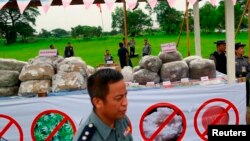The UN's Office on Drugs and Crime is starting a new program to help Myanmar's law enforcement system better crack down on drug trafficking and transnational crime. Rights groups are welcoming the program as a way to tackle the impunity and criminal activities that the United Nations warns are undermining Myanmar's development efforts.
The four-year $45 million program comes as the U.N.'s Office on Drugs and Crime (UNODC) says criminal activity in Myanmar, which is also known as Burma, is undermining the country's development, increasing human insecurity, and threatening the peace talks aimed at ending ethnic insurgencies.
UNODC South East Asia and Pacific regional representative Jeremy Douglas said the underground or “black” economy generates millions of dollars that are laundered into other areas of the economy, threatening the broader society.
"The [black] economy is very large in Northern Myanmar, primarily drug driven, but also there's a lot of precursor trafficking, there's the other forms of trafficking and transnational issues which are generating enormous income, income that is not in the hands of many and at the same time that the money needs to be moved and needs to be legitimized. So it does impact into the legitimate economy," said Douglas.
While Myanmar's economy has grown in recent years, driven by economic and political reforms, the country remains dogged by high rates of official corruption. Watchdog group Transparency International ranks Myanmar very low on its corruption rankings: 157 out of 177 countries.
The U.N. program, initially funded by the U.S., funds efforts to improve law enforcement capabilities in tackling transnational crime, including drug and human trafficking, environmental crime and border control. It also includes anti-corruption measures and reforms in the criminal justice and prison system. Douglas said one key target is development of alternative crops for opium farmers in the northeast.
Myanmar is the largest producer of synthetic drugs in Southeast Asia and the world's second largest opium producer after Afghanistan.
Rights activists say the opium and drug trade has led to powerful individuals rising through the political ranks, including in parliament. Myanmar rights activist Debbie Stothard said the increasing influence of such people is a cause for concern as the country's economy grows.
"Many blacklisted cronies who are being fêted by international business people have themselves become rich because of corruption and other connections to criminal activities. What we are seeing now is a situation where the past generation of criminals, organized crime, in many cases become respectable under the current reform regime,” said Stothard.
Stothard said people close to Myanmar's drug trafficking networks were elected to parliament in the 2010 elections. She said there is a link between these people being elected and higher rates of opium poppy production. The UNODC reported a 26 percent jump in opium production in Myanmar in 2013 to 870 tons, based on increased cultivation.
Stothard said concerns over human rights and lack of freedom and rule of law were seen to be linked to a rise in crime in recent years. Growing demands for land for development has also led to mounting conflict between developers and local people.
Phil Robertson, deputy Asia director for Human Rights Watch, points to on-going impunity as a growing problem due to rising criminal activity in the economy.
"The fundamental link between the black economy or the criminal economy that you are talking about and the issue of rights is the impunity that people have if they are well connected, if they are a crony of a minister, if they are connected to a military commander to abuse rights. The key issue is impunity," said Robertson.
Robertson added that a key test for the UNODC program will be if diminishes this culture of impunity by prosecuting well-connected persons involved in drug trafficking or other criminal activities.




